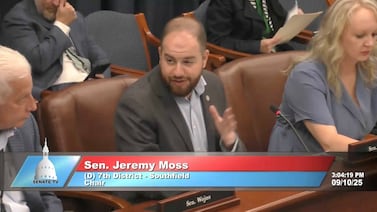Votebeat is a nonprofit news organization reporting on voting access and election administration across the U.S. Sign up for Votebeat Michigan’s free newsletter here.
LANSING — Michigan’s so-called false electors case is over, and defendants will not stand trial after a judge ruled Tuesday that prosecutors failed to show that 15 Republicans knowingly committed a crime by signing a document incorrectly claiming President Donald Trump won the state’s 2020 presidential election.
“This is a fraud case, and (you) have to prove intent,” Lansing 54-A District Court Judge Kristen Simmons told a packed courtroom, “and I don’t believe that there’s evidence sufficient to prove intent.”
Michigan Attorney General Dana Nessel had charged the defendants — including former Republican National Committee member Kathy Berden and former Michigan GOP Chair Meshawn Maddock — with eight felony counts, including forgery charges that Simmons said pertained more to property crimes than the facts of the case.
In announcing her decision to dismiss the case, Simmons highlighted testimony from James Renner, who was initially charged alongside the other 15 Republicans but later agreed to cooperate with prosecutors.
Renner was a “critical” witness who “testified that at the meeting, there was no intent to defraud (or forge) and that all of the proposed Republican electors that he encountered were trying to do what they believed was the right thing,” Simmons said.
Defendants had claimed they gathered to present an “alternative” slate of electors in the event a recount or legal challenge overturned Biden’s win in the state.
“The people’s chief witness testified it was his belief that the Senate could receive and then decide which (elector slate) they would accept,” Simmons said, “but that his intent was only for the document to be used if Donald Trump was declared the legal winner.”
The case is not about “the intent” of Trump attorneys Shawn Flynn, Kenneth Chesebro, Rudy Giuliani or even Trump himself, Simmons continued. It’s about the intent of “the people that were actually named in this case.”
The dismissal was met with applause and cheers from outside the 54-A District courtroom Tuesday. With supporters of the defendants on hand, the room quickly reached its 33-person capacity. Onlookers spilled out into the building’s hallways. Court staff removed some media, citing fire codes.
The charges were filed in July 2023 but date back to actions from December 2020, when the defendants allegedly signed a document claiming Trump had won Michigan’s presidential election despite his 154,188-vote loss to Democrat Joe Biden.
In a series of preliminary exams that began in December 2023 and concluded in October 2024, prosecutors argued there was ample evidence the defendants knowingly committed forgery by sending a slate of false electors to the National Archives and Congress.
Throughout pre-trial examinations, state prosecutors detailed how the would-be electors met at the Michigan Republican Party headquarters in Lansing to sign a document lawmakers could consider as a potential alternative to the Democratic slate of electors intended for Biden.
The certificate was subsequently delivered to the National Archives and to Congress before Congress certified Biden’s win on Jan. 6, 2021, when conspiracy theories about Trump’s election loss culminated in riots at the U.S. Capitol.
While preliminary exams in the case took more than two years to complete, Simmons said it was “preposterous” to claim the court did not decide in a timely manner whether to send defendants to trial, noting how many individuals were charged in the case and the breadth of documents filed.
“This is a hearing that marks the culmination of a lengthy and hotly contested felony preliminary examination,” Simmons said.
Jordyn Hermani covers state policy and politics for Bridge Michigan. She can be reached at jhermani@bridgemi.com.




